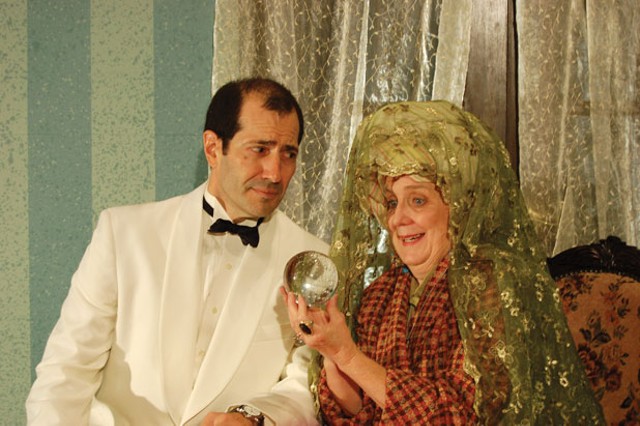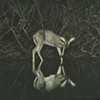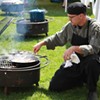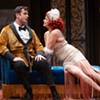Published July 21, 2010 at 5:30 a.m.
When World War II began, Englishman Noël Coward (1899-1973) set aside his flourishing theatrical and musical career to serve his country by joining Britain’s Secret Service. Prime Minister Winston Churchill, however, knew that buoying up British morale, especially among civilians, was essential to the war effort. Britons faced the terror of nighttime German air raids and the ever-present threat of invasion. Churchill saw a higher calling for the playwright, composer and performer than carrying out intelligence work. “Go and sing to them when the guns are firing,” he commanded Coward. “That’s your job!”
Shortly after Nazi bombs destroyed Coward’s own London digs, he penned the escapist comedy Blithe Spirit (1941). It took him just five days to write the three-act play, in which a medium muddles a man’s second marriage by mistakenly materializing his first wife’s ghost. Six weeks later, Coward directed the London premiere. His show struck a profound chord with his countrymen; the original West End run of 1997 performances outlasted the war itself.
Sadly, the current production of Blithe Spirit at St. Michael’s Playhouse is neither blithe nor spirited. Director Thomas Ouellette almost makes the witty script into an interminable “Saturday Night Live” sketch. Only Audra Wahhab’s engaging turn as the spousal specter Elvira truly enlivens the evening.
The action unfolds in the capacious living room of the Condomines. Novelist Charles invites quirky spiritualist Madame Arcati to conduct a séance. She’s unaware that he’s just studying her “tricks of the trade” for a future story. His wife, Ruth, and another couple join in the charade. But Charles gets a shock: The incantations unexpectedly summon Elvira’s chatty, catty ghost. Only Charles can see and hear her.
Confusion, consternation and ample hilarity ensue. Once Charles convinces Ruth that he hasn’t gone bonkers, the “astral bigamist” must mediate between bickering brides. Ruth fears that Elvira wants to bring Charles to the Other Side forever by killing him. Of course, nothing goes as planned — for anyone. Can Madame Arcati’s modest mastery of magic make things right?
Ouellette’s mosh pit of clumsy directorial moves bruises Coward’s exquisitely told tale. Slapstick sight gags and cartoonish British accents deaden the airy appeal of the sophisticated repartee and slow the pace of an already-long show. The caricatured Brit-speak actually makes some of the dialogue difficult to understand. And vivacious banter feels even more like tiresome prattle when the actors deliver it sitting or standing in place, because the director hasn’t given them anything to do.
Perhaps Ouellette was preoccupied with his frenzied choreography for Madame Arcati (Agnes Cummings), who wriggles and flops around the large set like a migrating salmon. But when Cummings calmly arches an eyebrow or lowers her voice to toss off one of Arcati’s muddled metaphors, she proves how the preceding silly antics trade the character’s charm, and the actor’s talents, for cheap laughs.
Sarah Carleton, as Ruth, delivers the weakest performance. Her accent sounds like a bad parody of Vivien Leigh doing Scarlett O’Hara. This compounds Carleton’s problems in establishing Ruth’s likeability and chemistry with Charles. Since we don’t care about Ruth or her marriage, many scenes drag, and we root for Elvira. On opening night, Carleton also stumbled over lines several times. This is understandable for a nervous community-theater amateur; for an Equity-Card-carrying actor (and University of Vermont theater professor) in a professional production, not so much.
Paul Joseph Bernardo’s portrayal of Charles suffers from the effects of Ouellette’s stilted direction and a stiff Ruth. Charles seems boring rather than boorish, dull instead of droll. Bernardo’s performance improves markedly, however, when Charles and Elvira spar. The “blithe” begins to come alive as he and Wahhab feed off the dialogue’s rhythm.
Wahhab is absolutely luminescent portraying the pert, petulant poltergeist. Elvira’s impish inner nature radiates from Wahhab’s upturned eyes and playful smile. She moves like a lithe, leggy sprite, perching on chair backs and draping herself over the sofa. Silvery makeup accentuates Elvira’s ethereal glow. The shimmery layers of costume designer Rachel Kurland’s chic, pale-violet flapper dress also enhance her ghostly presence. But the most polished element on stage is Wahhab herself, who twinkles with confidence as she relishes Coward’s delicious bons mots.
The wardrobe choices for other characters appear less inspired — atypical for the talented Kurland, who is the go-to costume designer for Vermont’s professional theaters. Carl Tallent’s set for the fussy, overstuffed living room features walnut furniture and a palette of deep rose and cream. Jeffrey E. Salzberg, as always, lights the stage well. Sound designer Joel Abbott conjures convincing effects, especially the scratchy gramophone playing Irving Berlin’s “Always” during Madame Arcati’s séances.
“Always” is also Charles and Elvira’s love song. And it highlights the cheeky play’s incredibly poignant subtext. When Blithe Spirit opened in July 1941, World War II had already taken many British lives. Everyone knew that many more deaths were to come.
Coward and his audience laughed together about summoning loved ones back from the Great Beyond. At the same time, they realized loss might drive many of them to share the fantasy that Berlin’s ballad underscores mournfully: I’ll be loving you / Always... / Not for just an hour, / Not for just a day, / Not for just a year, / But always.
Want to go?
Blithe Spirit, directed by Thomas Ouellette, produced by St. Michael’s Playhouse. McCarthy Arts Center Theater, Colchester, July 21-24, Wednesday through Saturday at 8 p.m. and Saturday at 2 p.m. $29-35. Info, 654-2281.
More By This Author
Speaking of...
-

Executive Director Kurt Thoma Leaves Barre Opera House
Mar 5, 2024 -

Vermonter's Musical Bound for Broadway With Hillary Clinton as a Producer
Oct 25, 2023 -

Phantom Theater Finds New Winter Venue in Waitsfield
Oct 13, 2023 -

Double E 2023 Summer Concert Series Kicks Off With the Wailers
Mar 17, 2023 -

Off Center for the Dramatic Arts to Reopen in the New North End
Sep 23, 2022 - More »
Comments
Comments are closed.
From 2014-2020, Seven Days allowed readers to comment on all stories posted on our website. While we've appreciated the suggestions and insights, right now Seven Days is prioritizing our core mission — producing high-quality, responsible local journalism — over moderating online debates between readers.
To criticize, correct or praise our reporting, please send us a letter to the editor or send us a tip. We’ll check it out and report the results.
Online comments may return when we have better tech tools for managing them. Thanks for reading.














































